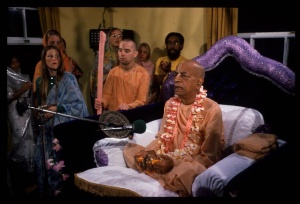CC Madhya 22.21

A.C. Bhaktivedanta Swami Prabhupada
TEXT 21
- kevala jñāna ‘mukti’ dite nāre bhakti vine
- kṛṣṇonmukhe sei mukti haya vinā jñāne
SYNONYMS
kevala — only; jñāna — speculative knowledge; mukti — liberation; dite — to deliver; nāre — is not able; bhakti vine — without devotional service; kṛṣṇa-unmukhe — if one is attached to the service of Lord Kṛṣṇa; sei mukti — that liberation; haya — appears; vinā — without; jñāne — knowledge.
TRANSLATION
"Speculative knowledge alone, without devotional service, is not able to give liberation. On the other hand, even without knowledge one can obtain liberation if one engages in the Lord’s devotional service.
PURPORT
One cannot attain liberation simply by speculative knowledge. Even though one may be able to distinguish between Brahman and matter, one’s liberation will be hampered if one is misled into thinking that the living entity is as good as the Supreme Personality of Godhead. Indeed, one falls down again onto the material platform because considering oneself the Supreme Person, the Supreme Absolute Truth, is offensive. When such a person comes in contact with a pure devotee, he can actually become liberated from material bondage and engage in the Lord’s service. A prayer by Bilvamaṅgala Ṭhākura is relevant here:
- bhaktis tvayi sthiratarā bhagavan yadi syād
- daivena naḥ phalati divya-kiśora-mūrtiḥ
- muktiḥ svayaṁ mukulitāñjali sevate ‘smān
- dharmārtha-kāma-gatayaḥ samaya-pratīkṣāḥ
"O my Lord, if one engages in Your pure devotional service with determination, You become visible in Your original transcendental youthful form as the Supreme Personality of Godhead. As far as liberation is concerned, she stands before the devotee with folded hands waiting to render service. Religion, economic development and sense gratification are all automatically attained without separate endeavor." (Kṛṣṇa-karṇāmṛta 107)